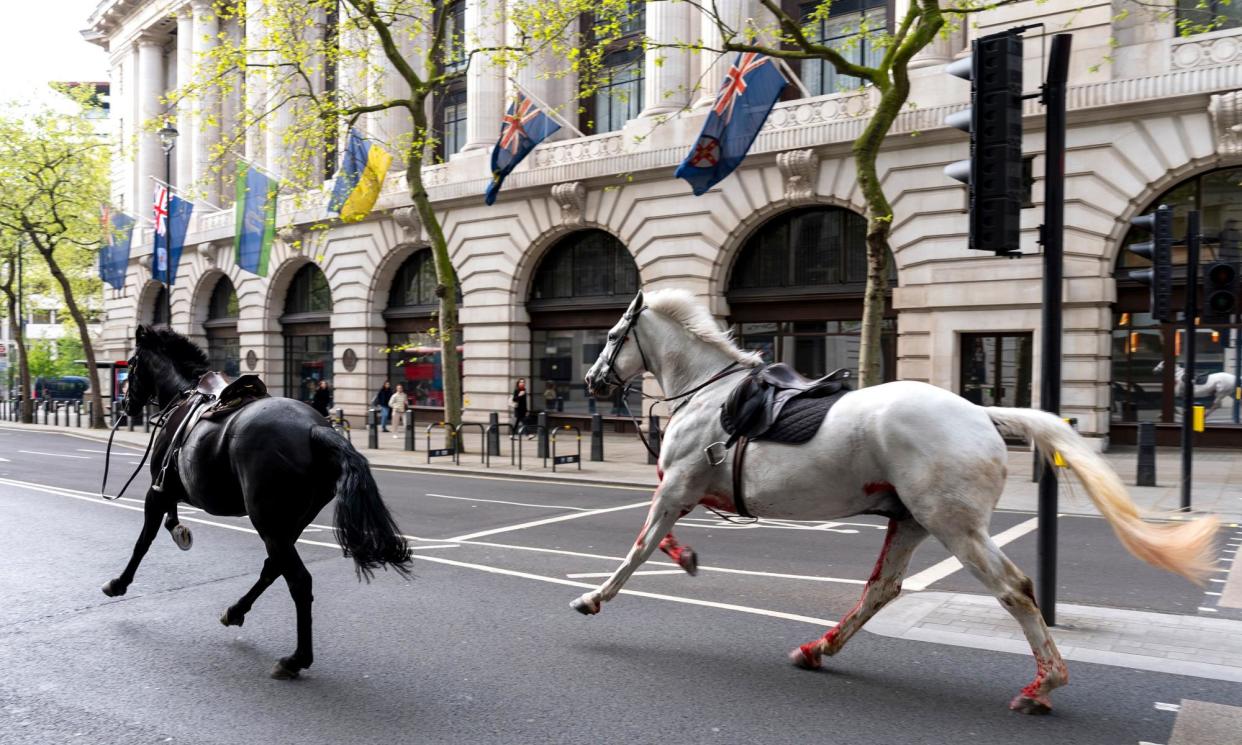Stress may be to blame for military horses bolting through London, says expert

The stress of life as a military horse could explain why several of the animals have bolted through London on two occasions in the past three months, an equine expert has suggested.
On Monday three horses from the Household Cavalry Mounted Regiment (HCMR) broke loose and ran through central London. Video footage showed one colliding with a car. It is thought one of the horses had been spooked by a bus, causing the other two to unseat their riders and run.
In April, five horses from the regiment bolted during an exercise in Belgravia, apparently after being spooked by rubble being dropped through a plastic tunnel. The animals were filmed dashing through the city’s streets, one white horse drenched in blood. Two ended up in a serious condition and several people were injured.
A source close to the regiment said incidents of horses being spooked and riders unseated occurred on a regular basis, although not on such a scale, and there had been years where nothing of such magnitude had occurred. In the vast majority of cases, the horses do not bolt, they said. They either stay with the other horses or head back to barracks.
The source added that the two recent incidents were unconnected, and that nothing was being done any differently to previous decades. Instead, they said the timing of the events was an unfortunate coincidence, and that the dramatic events in April had created significant interest in this week’s less serious occurrence.
Justine Harrison, an equine behaviourist, suggested the stress of life as a military horse could have played a role in the recent events.
“London’s sights and sounds will be overwhelming for them and no amount of training can fully prepare them for every situation they may encounter,” she said, adding that bolting was an extreme fear response and that since horses were herd animals, should one become frightened and bolt, others may follow suit.
She said horses may be more reactive or fearful if they were in pain, exposed to aversive training techniques or not adequately prepared for what they would encounter. Inappropriate management, human error or having an inexperienced rider or handler could also lead to such behaviour, she said.
“Horses are all individuals and some may have a predisposition to be more reactive than others,” Harrison said. “However, I would imagine the Household Cavalry would have a screening programme to ensure they select horses with the most reliable and calm temperaments.”
She said that while she was confident the military horses were well looked after physically, she questioned whether their behavioural needs were being met, noting that they were stabled without daily turnout or any time to relax and graze in a natural environment.
“The ongoing stress of this confinement will undoubtedly affect the horses behaviour, and that in turn could lead to them being more reactive,” she said. “How these horses are kept and trained is so different to what a horse needs from an ethological perspective, there is always going to be a risk of these unwanted consequences.”
While none of the horses involved this week were also involved in the bolting in April, Harrison said traumatic experiences – like those experienced by the animals that bolted – could affect a horse’s future behaviour.
“Even with careful rehabilitation, the risk of relapse is high, especially when put in the same environment or exposed to similar triggers,” she said.
In June last year it was revealed that concern over the risk of military horses bolting in panic was one of the reasons why the Met police had a lower threshold for arrests during the coronation of King Charles.
According to the Evening Standard, the force’s assistant commissioner Louisa Rolfe said officers were aware of plans for the animals to be scared by rape alarms and by other means, and the military horses taking part were not trained to cope in the same way as police horses.
However, it is not only military horses that have hit the headlines: in June 2020 a police horse bolted and collided with a traffic light amid unrest during anti-racism protests in London. A female mounted police officer was unseated and left with broken bones and a collapsed lung.


